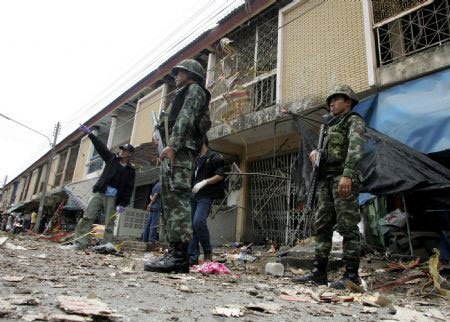by Weena Kowitwanij
Asia News – 08/09/2009
Phrapromchariya, a monk from the Royal Kapungsurin temple, speaks out on drug abuse, which he defines a « national problem ». Those responsible for the attacks act « under the influence of drugs. » He invites monks to avoid being overcome by fear, the government must not think only of economic development projects.

Bangkok (AsiaNews) – Attacks and massacres in the southern provinces, which have even affected Buddhist monks, teachers and pregnant women are « a source of deep sorrow. » They are linked to « drug abuse », a « national problem » in Thailand: drug addicts, in fact, commit acts of violence « under the influence of drugs”. This is the view offered by Phrapromchariya, Chief monk at the Kapungsurin Buddhist temple, who has witnessed « from the 2004 to today a growing violence. »
The Royal Kapungsurin Temple is located in Muang district, in the southern province of Trang, about 852 km south of Bangkok. Phrapromchariya is the head of a congregation, and follows the activities of the monks of the five provinces in southern Thailand. He has witnessed clashes and attacks « involving three provinces in five years, » but today the situation has become even more aggravated with the violence afflicting monks, teachers, pregnant women, who have been killed or injured during attacks » .
Thai premier Abhisit Vejjajiva has formed a special committee to promote cooperation and development programs for the five provinces in the South: Songkhla, Satul, Yala, Pattanee and Narathiwas. They have long been the scene of a separatist war led by a local Islamic fringe that strives for annexation to Muslim Malaysia. Suthep Thueksuban, vice-premier, is confident and assures that « the situation will improve ». Thavorn Seanniem, vice-minister for security, reports a decrease « in the dead and wounded » in the first six months of the year, compared to the same period of 2008.
Despite the commitment of the executive, the problems persist and the initiatives related to the economy and development do not seem to suffice. Phrapromchariya explains that the policy of « understanding, access and development » also endorsed by King Bhumibol « has failed to get to the root of the problem ». « One time – he adds – Buddhists and Muslims lived in peace and harmony, depending on each other in a sign of a true solidarity. Today things have changed for the worse, despite the development programs ».

Phrapromchariya finally invites monks to avoid being overcome by fear, to the point of no longer « leaving the temples » to receive the offerings of the faithful. « It’s part of the culture and local traditions – he concludes – inherited over time and must continue, regardless of political instability ».




